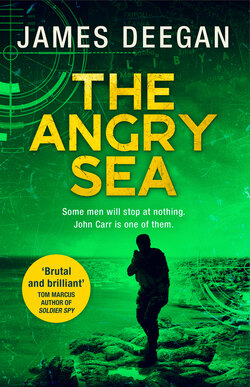Читать книгу The Angry Sea - James Deegan - Страница 20
Оглавление7.
THREE MONTHS LATER
JOHN CARR LAY on a white towel in the hot sand, propped up on his elbows, staring out at the tranquil Mediterranean Sea.
Gentle waves – no more than ripples – broke, soft and frothy, on the beach.
Close to the shore, the Med was striped in dazzling turquoise shades, decorated with playful flashes from the noonday sun; further out, the waters turned a dark and mysterious blue, flat calm but hiding myriad untold secrets in their timeless depths.
It was very beautiful, Carr had to admit.
But despite that he was as restless as ever.
There were things John Carr liked about beaches, and things he didn’t.
The things he liked were good-looking young women in bikinis – who often liked him right back.
The things he didn’t like were sand, heat, flies, screaming kids, lying around doing nothing, and being caught looking at good-looking young women in bikinis by his teenaged daughter.
There was plenty of eye candy in the vicinity, but Alice was immediately to his left.
Stretched out on her towel, wearing mirror shades.
He thought she was asleep, but he couldn’t be sure, because he couldn’t see her eyeballs, because of the mirror shades.
So he kept his own eyes front.
John Carr had retired from 22 SAS as a Squadron Sergeant Major, having fought his way across every theatre of operations from the first Gulf War onwards in a long and distinguished career.
He’d twice been decorated for gallantry – not for nothing had he been known as ‘Mad John’ – and he had taken no shit from anyone in a very long time indeed.
But Alice, seventeen years old, and sixty-two kilos wringing wet, could bring him to heel with one withering look and a few choice words.
He wasn’t sure what they were filling her head with at Cheltenham Ladies’ College, for his thirty-five grand a year, but a lot of it seemed to revolve around the patriarchy, feminism, and the objectification of women.
It mystified Carr, who’d grown up in the 1980s on the streets of the rough Edinburgh suburb of Niddrie: he respected birds, right enough, but since when had it become a sin to fucking look at them?
Still, better safe than sorry.
He rubbed the livid, inverted-crescent scar on his chin, and stared dead ahead.
They were twenty metres from the sea.
It really was beautiful.
Shame about those screaming kids.
One of them was really wailing now – he’d dropped his ice cream in the water, snot was bubbling from his nose, and his fat, orange, German dad was trying to calm him down.
Shame about the kids, and a shame about the sand in Carr’s shorts, too.
And in the crack of his arse, and between his toes, and gritty in his mouth.
He sighed, and looked to his right.
His son George – seven years older than Alice – was eyeing up a couple of pretty Spanish girls, his own girlfriend face-down on her towel and oblivious.
Beyond George, a couple of older blokes casually ogled Alice as they trudged by.
Carr stared at them, hard, and once they caught his eye, and clocked his menacing physique, they looked quickly away and moved on.
He glanced down between his legs and flicked at a piece of dried seaweed with a grey driftwood twig.
Funny how life turns out.
You grow up in a council tenement block, surrounded by concrete, broken glass and graffiti, you don’t expect to find yourself rubbing shoulders with Europe’s filthy rich on a beach at Puerto Banús.
Back home in the UK, Carr’s day job was as head of London security for the Russian oligarch Konstantin Avilov. Earlier in the year Carr had taken out a Ukrainian hitman who had tried to kill his boss on the streets of London, as part of the ongoing, low-level power struggle which increasingly stretched out from Moscow in every direction around the globe.
As a thank you, his boss had given him a big payrise, and a Porsche Cayenne – bit tacky, for Carr’s taste, so he’d quickly swapped it for a classy 5.0L V8 Supercharged Range Rover, in Spectral British Racing Green.
Avilov had insisted, too, that he take a couple of weeks at his Marbella villa, a ten-bedroomed, chrome-and-white monument to vulgarity, in a gated community five minutes away at Vega del Colorado.
Take the family, Johnny. It’s a thank you for everything what you done for me.
Including saving my life, he hadn’t said.
But both men knew.
A woman in her early thirties came into his eyeline, canvas bag in hand and diaphanous sarong hugging her hips, and gave him a long look through her Dior shades as she passed by.
Carr grinned at her, and then she was gone.
He looked at his watch.
One o’clock.
God, he was bored.
Sitting here, slowly chargrilling himself to death, in the heat of a Spanish midday in early August.
Christ, the heat.
Unlike many Scots, he was dark-haired and he tanned easily. Added to which, he’d spent enough time in hot, sandy places – carrying a rifle, 100lbs of kit and ammo in his webbing and bergen, and wearing a lot more than a pair of shorts – to have got used to it.
But somehow Afghan heat, Iraqi heat, African heat, didn’t feel so bad.
He grinned to himself: maybe it was the rounds cracking off past your swede. That had a funny way of putting things like the ambient temperature into context.
The two pretty Spanish girls got up and wiggled and jiggled off down to the water, giggling as they went.
Carr risked a quick glance.
Caught George’s eye.
‘You sad bastard,’ said his son, with a grin and a shake of his head. ‘You sad, sad bastard.’
